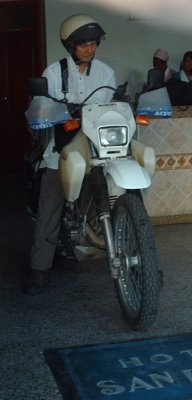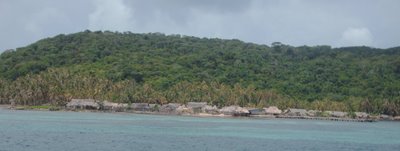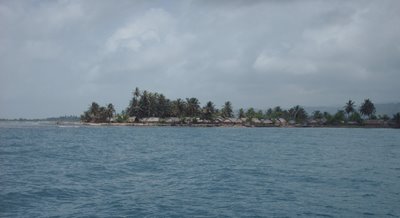TUESDAY, AUGUST 7We have enjoyed little sleep over the past three days. We have waded ashore. We have ridden for eight hours. Ming is in shorts and a T-shirt. I wear a long-sleeve red cotton shirt and Chinos that had seen better days when they were new. We are unwashed. We stink. And we are illegals.
We follow the sighns to the Historic center of Cartagena. The road swings round the bay and we spot a yacht marina. We need advice and Colombians who deal with yachts deal with customs and immigration. Alirio de Avila Lora is boss of wharehouseing and imports at TODOMAR MARINA S.A. He listens to our story and despatches us behind a guide on a small Suzuki to the Office of Immigration. We explain our case to an official. His boss must decide our fate. We wait nervously on an old sofa in an outer office. Four female officials occupy the office. One is dealing with two young foreign women one of whom is bored and reads a book while her friend has her fingerprints entered. Reading strikes me as neither politic nor polite. A middle-aged Itallian is complaining loudly at another desk. His voice is brutal and he jabs fingers at documents he presents and at papers the woman official peruses. The woman catches my eye and raises her eyebrows in exasperatioon. I reply with a grin of sympathy. The exhausted Ming has dozed off and is tilting sideways. I dig him in the ribs. The boss returns. Once more we recount our story., apologise for our appearance, explain that we came directly from the road. He asks how long we intend staying in Colombia.
We say, Ten days, possibly two weeks.
We return to the outer office. I ask one of the women what nationalities she finds most courteous and which are the most asrrogant. She sanswers without need for thought: all Ecuadorians are courtous. Italians are invatriably rude and arogant.
The boss returns our passports. He has written
60 days on a Cartagena entry stamp. "Hurry," he tells us, "and you will reach the Customs offices before they close."
Our guide on the Suzuki has been guarding the bikes. He leads us to the Customs. We are directed to a large open-plan office. We relate our adventure to an official who finds us hilarious. He gathers his fellow officials. They find us hilarious. Ming is the center of atraction. Ming is a make of celluar tellephone imported from China. What does Ming mean?
"It is my name," Ming says.
"But it has a meaning?"
"People," Ming says. "Ming is people."
We are part of an ongoing joke beween our official and the boss. The boss is a dark tall elegant man. He speaks with Ming in English - not about our bikes or illegal arrival in Colombia - about matters of language and Ming's past. Meanwhile import papers for our bikes acrue signatures as they circle from desk to desk. A beautiful young woman enters their numbers in a ledger. The boss adds a final signature and we can leave. I say to the boss that I am reluctasnt to leave when faced by such beauty. The boss laughs. The woman asks for a translation.
"Be satisfied," her boss sys, "satisfied that it was extreemly complimentary."
I kiss her hand and we leave. We are legal.
I remark to Ming that, were this England, we would have been filling forms for a month.
Ming says, "In the States some would have shot us."




